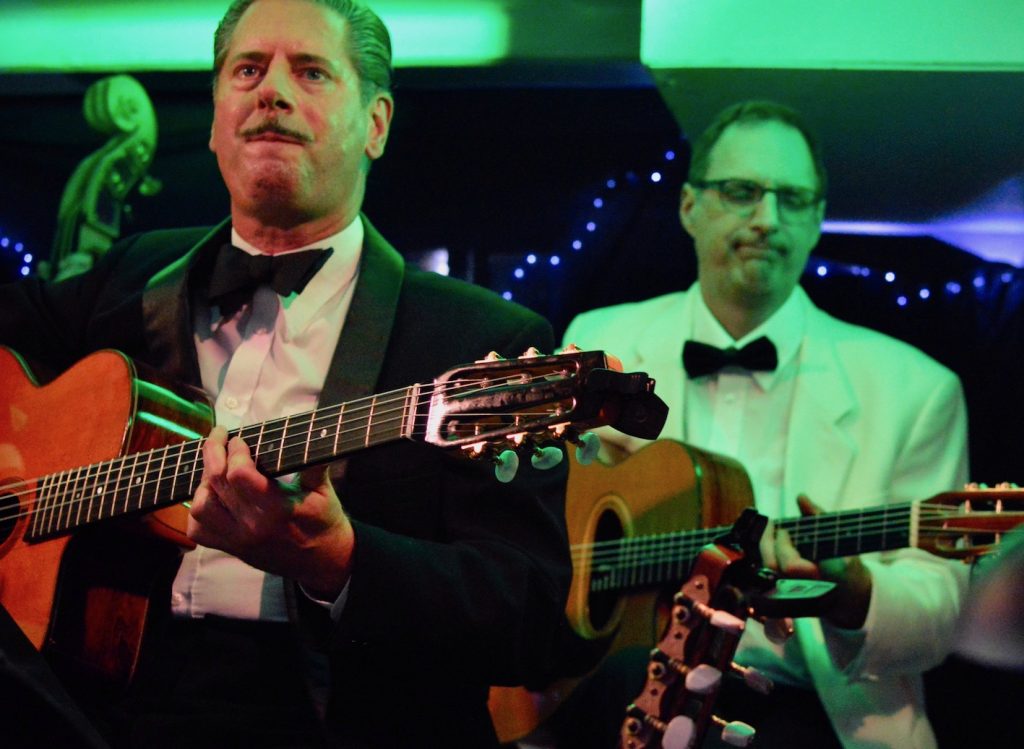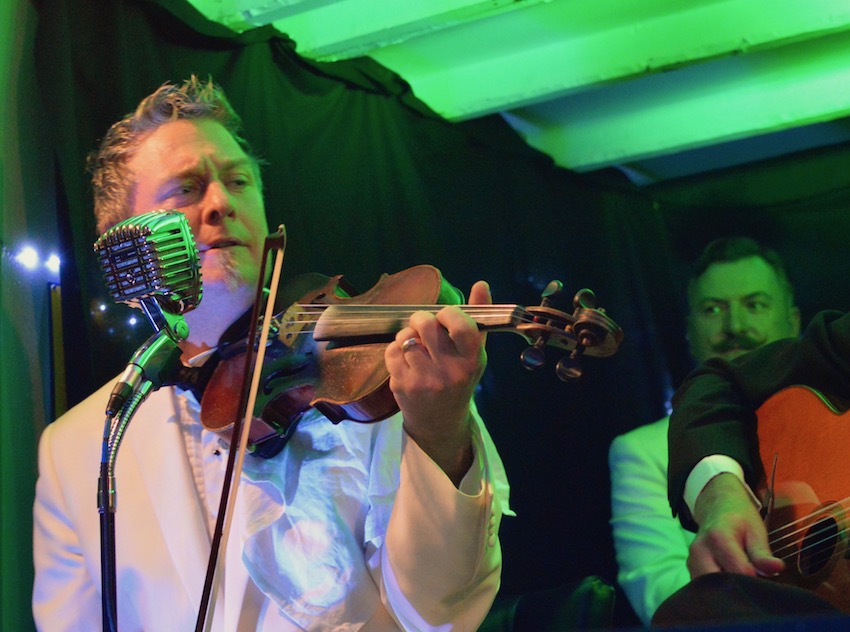Django unplugged – well almost
When I was young, jazz was played a lot in our house – and then there was the Hot Club of France. Where jazz of the New Orleans or Chicago varieties was considered a bit edgy, raucous and a little naughty, the swing of Reinhardt and Grappelly (or is it Grappelli?) was more refined, polite, European.
And that is where Viper Swing take us with their hugely entertaining bio-oeuvre ‘Playing Django’ down in le caveau de jazz that is the basement of the Argyle for tonight, as well as locations from Claridges to Paris under the Nazi jackboot.
The show follows the musical life of Jean ‘Django’ Reinhardt, born into a Belgian gypsy family, burnt severely in a caravan fire as a teenager leaving him temporarily paralysed but with the third and fourth fingers of his left hand permanently fused together. It was amazing he could play the guitar at all – let alone hold a cigarette.
It’s hard to think of any Belgians more famous than Django. Hergé? Poirot? Plastique Bertrand!? I don’t think so. Ca ne plane pas pour moi!
And Viper Swing deliver the tunes with outstanding musical dexterity, the modern-day Hot Club being Paul Paterson on guitar as the “world-famous” Django; Dirk Ronnenberg on fiddle as an engaging Stéphane (doubling on vocals as US crooner Freddie Taylor); David Midas as Django’s brother Joseph on rhythm guitar, and Matt Curtis as Louis Vola on bass.

The show kicks off with Daphne, the result of a little noodling by Grappelly (Grappelli) that Reinhardt turned single-handedly (in his opinion) into a decent jazz tune, then Coquette, followed by a rip-roaring Tiger Rag. The great depression might have been taking hold in the ’30s but its music was the perfect tonic (even if the gin was prohibited).
Django was “devil may care”, sometimes ignoring the band’s meticulous dress code which for the most part is/was an exhibition of sartorial elegance – a white tux-sporting, living advertisement for Vitalis hair oil and moustache wax! But Django was “unreliable”, turning up for gigs late, or not at all, or without a guitar, negotiating a huge fee for himself and then gambling it away.
The show has singing (Lady Be Good, I Can’t Give You Anything but Love etc), swinging (Minor Swing), a joyous Djangology, and a blistering Limehouse Blues, where Dirk’s fiddle fingers were on fire drawing the first applause for a solo from an enraptured but polite full house who warmed up through the performance.
Set two presented the Hot Club in minor turmoil over returning to Paris. France has been invaded. Django wants to go back, but Stéphane questions his decision. Jazz is banned, Jews and gypsies are being persecuted and packed off to concentration camps. Django returns, his poignant composition Nuages becoming the country’s most popular song with La Marseillaise banned.

Time moves on. We are taken from the Astoria Club in Milan to Nice Jazz Festival and the Club St Germain, Paris. Stéphane has reunited with the band which embraces bebop, Django’s goes electric as they explore new sounds and blur the lines. The musical versatility continues as the quartet take us through Swing 48, September Song and Topsy. And then, in May 1953, Django dies.
The show captures the perfect balance between the pre-recorded narrative, the on-stage papotage, the stunning music and vocals, and the cheeky vocal responses that permeate the songs. Sweet Georgia Brown wraps up the proceedings.
Hate or love jazz you’ll love this and Django truly was one of the greats. Is it too much to say this is an homage? And whether it is or isn’t, Viper Swing do Django, his memory, the Hot Club and the genre that is gypsy jazz, proud.
Catch Viper Swing and ‘Playing Django’ while you can. Several performances at the Argyle starting Thursday 15 August 2019, but check the website for exact details www.viperswing.com
Cinq etoiles, sans aucun doute!!